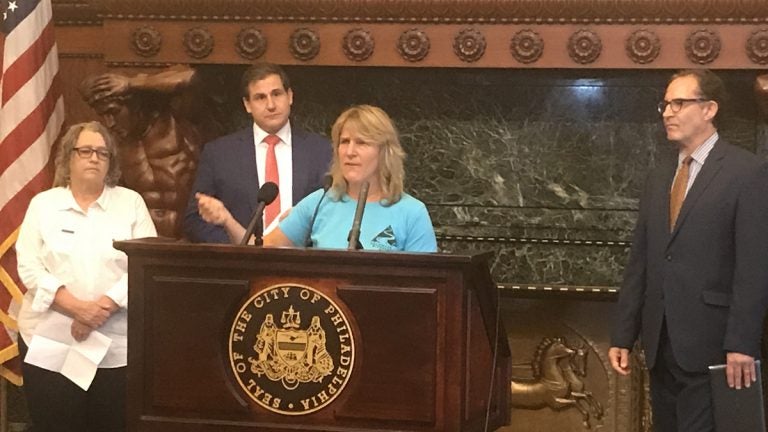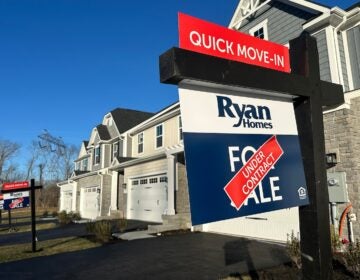Pa. lawmaker again pushing for stronger protections against litigation meant to intimidate

Maya van Rossum of the Delaware Riverkeeper Network pushed for an expanded anti-Slapp law at Philadelphia City Hall. Her nonprofit has faced two such lawsuits in recent years, which she says have been aimed at silencing the group's activism. (Bobby Allyn/WHYY)
Philadelphia and Pennsylvania officials gathered Wednesday at City Hall to call attention to efforts to protect community groups from lawsuits meant to intimidate or silence them.
State Sen. Larry Farnese, a Philadelphia Democrat, is pushing for expanding protections against what are known as SLAPP suits — or strategic lawsuits against public participation.
Pennsylvania and 28 other states have such regulations, yet Farnese and many community organizations say the state’s current protections are too narrow. Legal experts have said that the regulations have been interpreted in such a limited way by state courts, rendering the law effectively toothless.
Farnese has re-introduced a bill that would establish broader regulations against the decades-old legal tactic. And while the measure passed the state Senate, it may face stiff resistance among members of the Pennsylvania House.
Typically, the suits are filed by a developer or business interest aiming to put a civic organization or activist group out of existence or muzzle public criticism, according to those who support the passage of more expansive protections against SLAPP.
“These are lawsuits that are brought by organizations with very, very deep pockets with the intention to try to force those folks who were advocating for issues they believe in to be prevented from bringing their advocacy to the general pubic,” Farnese said.
In June, developer J. Brian O’Neill sued Maya van Rossum’s Delaware Riverkeeper Network, an environmental group, for criticizing a Chester County project planned for a contaminated industrial site. A judge last month tossed the suit, but van Rossum said the process created pain.
“It cost us over $10,200 to defend against this claim,” said van Rossum, noting that it was the second SLAPP suit her organization has faced in recent years.
Farnese’s bill, which in April passed the Senate, would require plaintiffs to prove to a judge that the motive behind the action is not to attack free speech.
“A person who engages in any constitutionally protected communication shall be immune from any civil action for claims based upon such communication,” according to Farnese’s legislation, Senate Bill 95.
The bill would also place the lawsuit on hold until a dismissal claim is resolved and allow defendants to recover legal costs and fees.
Last legislative session, Farnese’s bill was shelved in the House.
The Pennsylvania Chamber of Commerce has vigorously opposed expansion of the anti-SLAPP law, saying critics will use it as an excuse to publicly slander proposed developments or other business enterprises.
But Farnese said these types of suits are not about protecting the reputation of a business or developer.
“The real goals are to financially harm the litigants to the point where they have no choice but to give up the lawsuit, walk away and be silenced forever,” said Farnese on Wednesday.
Philadelphia City Councilman Mark Squilla said neighborhood organizations in the city have folded, or have teetered on the brink, following SLAPP suits.
“Nobody’s saying we have to agree with every developer, and nobody is saying that the developer has to agree with the community,” Squilla said. “But we believe that these lawsuits that are put in place to smack down the community because they had the ability to do that is not the right way to go about business.”
WHYY is your source for fact-based, in-depth journalism and information. As a nonprofit organization, we rely on financial support from readers like you. Please give today.




